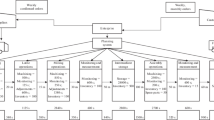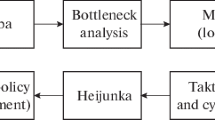Abstract
Small and medium-sized companies encounter enormous difficulties when trying to implement lean production methods according to the role model of the Toyota Production System. This is caused by the varying effects of lean methods on production figures depending on the production conditions concerning product variety and volumes, variation of process and set-up times, etc. This article presents approaches developed at the Institute of Production Science (wbk), Karlsruhe Institute of Technology, to evaluate and optimize the effects of lean methods in small series productions based on the quantified interdependencies with the relevant target figures. It enables the best combination of lean methods to be identified and recommendations for the efficient implementation of these lean methods.





Similar content being viewed by others
References
Ohno T (1993) Das Toyota-Produktionssystem. Campus, Frankfurt am Main
Uygun Y, Keßler S, Stausberg JR (2009) Verbreitung Ganzheitlicher Produktionssysteme—Erkenntnisse aus einer deutschlandweiten Studie. wt Werkstattstechnik online 99:136–140
Nicholas JM, Soni A (2006) The portal to lean production—principles and practices for doing more with less. Auerbach Publications, New York
Zäh MF, Aull F (2006) Lean production-methoden und interdependenzen. wt Werkstattstechnik online 96:683–687
Brunner F (2008) Japanische Erfolgskonzepte. Carl Hanser, München
Gulden A (2008) Lean production in the single unit and small batch production. Seminar: lean production in the machine tool industry, Aachen
Lanza G, Peter K (2009) Simulation-based quantification of interdependencies between lean methods and production figures. Keynote Paper at the 16th CIRP international conference on life cycle engineering, Kairo, pp 2–9
Reinhart G, Zäh M, Habicht C, Neise P (2003) Einführung schlanker Produktionssysteme. wt Werkstattstechnik online 93:571–574
Pavnaskar SJ, Gershenson JK, Jambekar AB (2003) Classification scheme for lean manufacturing tools. Int J Prod Res 41:3075–3090
Korge A (2005) Ganzheitliche Produktionssysteme auch für den Mittelstand. In: Zäh MF (ed) Produktionsmanagement 05. Herbert Utz Verlag, München
Obayashi K (1995) 20 Keys to workplace improvement. Productivity Press, New York
Herrmann C, Bergmann L, Thiede S (2007) Gestaltungselemente und Erfolgsfaktoren—Ergebnisse einer empirischen Umfrage unter produzierenden Unternehmen. Intelligenter Produzieren. VDMA-Verlag 3:20–22
Uygun Y, Keßler S, Stausberg JR (2007) Lean production systems along the value chain. 3rd international conference on business management and economics, Izmir, Turkey
Lay G, Zanker C (2008) Planungsinstrumente zur Verwirklichung Ganzheitlicher Produktionssysteme in kleinen und mittleren Unternehmen. wt Werkstattstechnik online 98:242–248
Winkler H (2007) Modellierung vernetzter Wirkbeziehungen im Produktionsanlauf. Dissertation, Leibniz-University, Hannover
Daenzer WF, Huber F (2002) Systems Engineering—Methodik und Praxis. Industrielle Organisation, Zürich
Hopp JH, Spearman ML (2000) Factory Physics: Foundations of Manufacturing Management. McGraw-Hill, New York
Shingo S (1996) Quick Changeover for operators: the SMED System. Productivity Press, Cambridge USA
Peter K (2009) Bewertung und Optimierung der Effektivität von Lean Methoden in der Kleinserienproduktion. Dissertation, Universität Karlsruhe (TH)
Wiendahl HP (1997) Fertigungsregelung. Logistische Beherrschung von Fertigungsabläufen auf Basis des Trichtermodells. Carl Hanser, München
Acknowledgments
The authors are grateful for the financial support by the ‚Concept for the Future’ of the Karlsruhe Institute of Technology (KIT) within the framework of the German Excellence Initiative.
Author information
Authors and Affiliations
Corresponding author
Rights and permissions
About this article
Cite this article
Peter, K., Lanza, G. Company-specific quantitative evaluation of lean production methods. Prod. Eng. Res. Devel. 5, 81–87 (2011). https://doi.org/10.1007/s11740-010-0276-8
Received:
Accepted:
Published:
Issue Date:
DOI: https://doi.org/10.1007/s11740-010-0276-8




